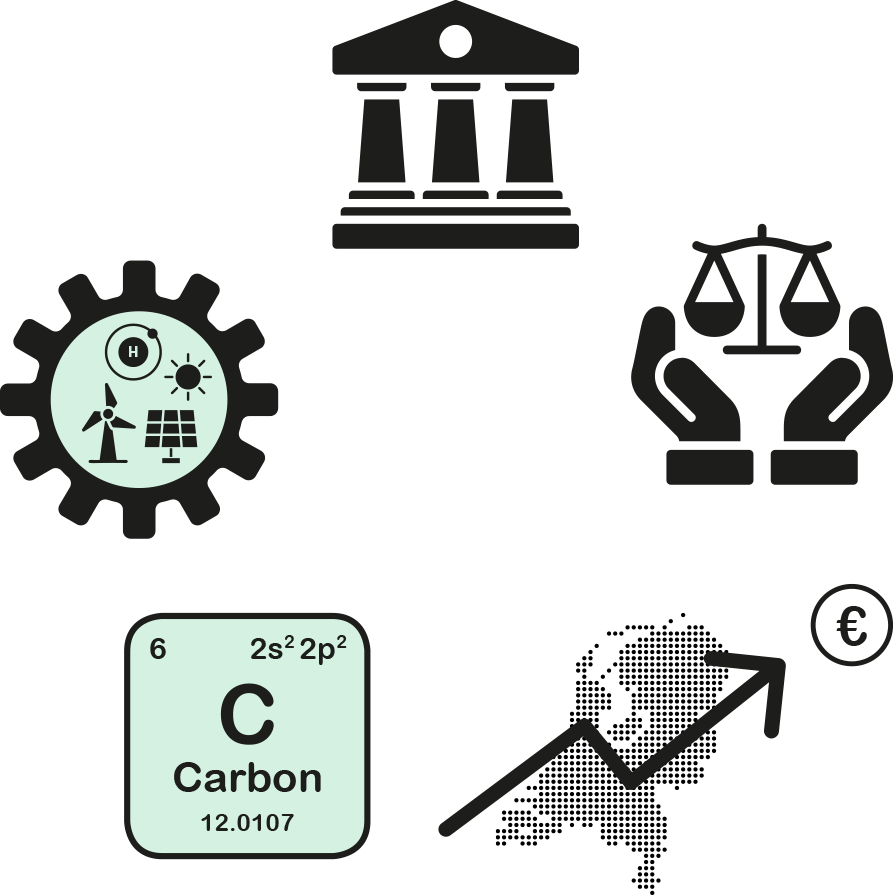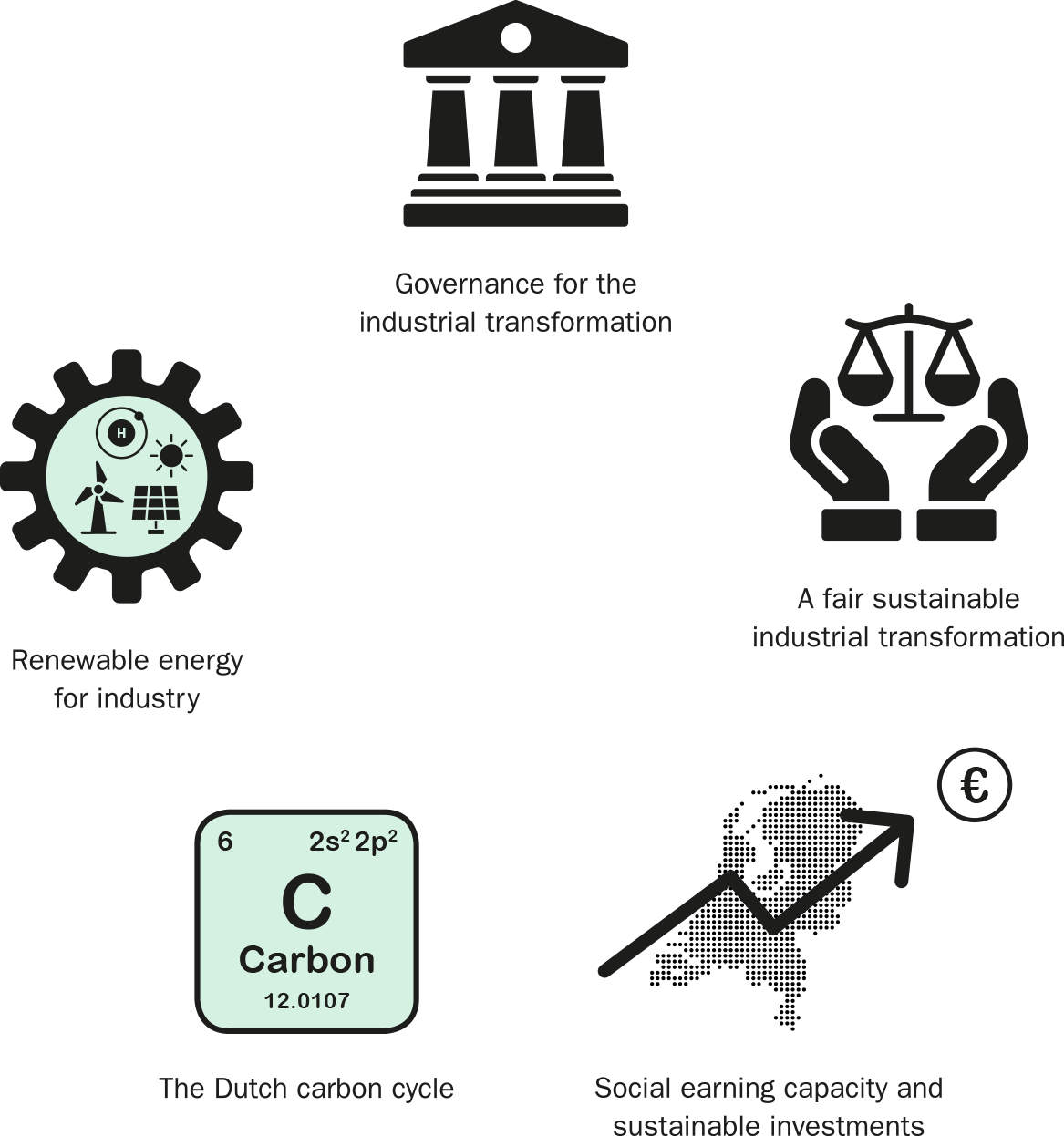About
The Sustainable Industry Lab (SIL) distills important choices and their consequences of the industrial sustainable transformation between 2020 and 2050. By means of synthesizing academic and expert knowledge, SIL aims to improve the quality of the societal and political debate to reach a carbon neutral Dutch industry by 2050.
SIL furthermore aims to reach this goal by realizing a visualization of possible industry futures, fitting into the global sustainability agenda as well as the Dutch economic aspirations. Over the next five years, SIL will work on academic and policy papers, informing society and policy makers on the consequences of certain choices.
Vision
Our vision is the acceleration of the industrial transformation that matches national economic aspirations with the global sustainability agenda.
Mission
Our mission is to:
- · articulate and visualize consequences of important choices
by combining academic and expert knowledge; - · raise the level of societal and political debate on the choices
related to the transformation of Dutch industry; - · imagine and visualize the futures implied by the choices.
Strategy
The Sustainable Industry Lab brings together academia, industry, government and societal partners, to synthesize and unlock knowledge necessary for the choices ahead. Through futuring techniques, collaborations between academia and stakeholders and a creative process, the Sustainable Industry Lab will fulfil an independent position in the societal and political debate. Our activities are aimed at offering knowledge and policy recommendations to untangle essential societal dilemmas.
The central focus of the Sustainable Industry Lab is to articulate choices and consequences to reach a carbon neutral Dutch industry by 2050. The activities and deliverables are organized around five themes.

Clockwise: Governance for the industrial transformation / A fair sustainable industrial transformation / Social earning capacity and sustainable investments / The Dutch carbon cycle / Renewable energy for industry
Renewable energy for industry
The theme renewable energy for industry focuses on the future renewable energy resources for industry in the Netherlands, addressing the challenge that the Netherlands has a comparatively large and energy-intensive industrial sector that domestic renewables are primarily electric (wind and solar) and constrained by competition for land and offshore use.
The Dutch carbon cycle
The Dutch carbon cycle theme looks at the interplay between the energy transition and the ambition for a circular economy. In our industry, in particular the petrochemical industry, these ambitions tie together in ways that are as yet poorly understood.
Social earning capacity and sustainable investments
Dutch industry is essential for the social earning capacity. To align the global sustainability agenda with Dutch economic aspirations sustainable investments must be enabled. This theme explores the ambitions for a carbon-neutral Dutch industrial portfolio by 2050, possible investment pathways and conditions for future-proof and responsible business cases.
Governance for the industrial transformation
Governance, or the public-private organization of the energy transition, is essential for a successful industrial transformation. In this theme we explore questions such as: Who bears the responsibility to enable, accelerate or enforce climate policy and actions? At which governmental level, international, European or national, can we best regulate or create policy instruments?
A fair sustainable industrial transformation
The concept of the fair energy transition bridges the gap between traditional techno-economical decision-making and the societal implications. In this theme we explore how the sustainable industrial transformation creates impacts on different groups, such as employees and employers, businesses, local residents, governments and societal and environmental organizations. We also study how potentially negative impacts can be reasonably mitigated.
Activities and deliverables
Within the Sustainable Industry Lab we bring together leading academics with societal stakeholders from industry, government and civil society, notably including NGO’s. We aim to create a safe environment for open and frank exchange of ideas and concerns. To ensure this, we have assembled a network of academics and employees of industrial parties, government, societal and environmental stakeholders and NGO’s, the member group of the Sustainable Industry Lab. This core group of representatives has committed to investing their time in the co-creation of output of the academic work stream. For any project, experts will be invited to join.
The five main research themes will be further elaborated upon and defined through workshops, in order to identify research questions, projects and methodologies. For each theme, one researcher and one member of the stakeholder member group will be responsible for the progress, projects and outcomes. An annual research program as well as a strategic work plan for the five-year period will be drafted in the first half of 2021.
One of the central goals of the Sustainable Industry Lab is to encourage a societal dialogue. Therefore, presentations of project results will be used to reach out to a wider community. Outreach to the public at large takes place by means of the visualization.
Organization
The Sustainable Industry Lab consists of a board, a supervisory board and a member group of the Sustainable Industry Lab. The board decides how to allocate funding and is in charge of pursuing new funding opportunities. It is moreover responsible for the daily management of the two works streams. A supervisory board, consisting of representatives from government, research, industry and NGO’s, oversees the activities of the board, advises on annual research plans, and approves annual financial and performance reports. The member group, consisting of academics and experts, collaborate on research projects within the main research themes, stakeholder process and creative work stream.
Funding
The Sustainable Industry Lab is funded through external partners with a budget of € 800.000 for five years (2021-2025)1. Additionally, commitments to contribute to the Sustainable Industry Lab member group and related activities have been secured from government representatives, industrial companies, academics, other research partners and NGO’s.
- 1. The Ministry of Economic Affairs and Climate Policy has formally awarded a subsidy for five years of € 700.000. The remaining subsidy of € 100.000 will be contributed by VNCI, VEMOBIN, VNP, VEMW, VNO-NCW and Element NL.









